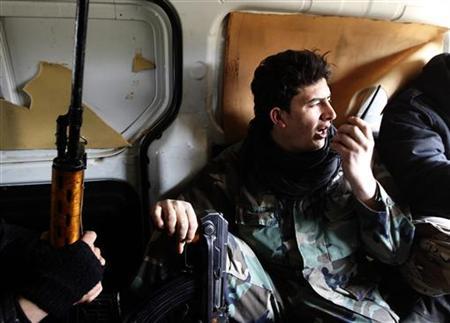Ben Hubbard of The New York Times writes about the international “operations center” in Jordan which is supposed to coordinate assistance to insurgents in southern Syria, but which has been beset by claims that the US is hindering the aid:
Many rebels say they believe that the Obama administration is giving just enough to keep the rebel cause alive, but not enough to actually help it win, as part of a dark strategy aimed at prolonging the war. They say that in some cases their backers even push them to avoid attacking strategic targets, part of what they see as that effort to keep the conflict burning.
“The aid that comes in now is only enough to keep us alive, and it covers only the lowest level of needs,” said Brig. Gen. Asaad al-Zoabi, a Syrian fighter pilot who defected and now works in the operations room.
“They call it aid, but I don’t consider it aid,” he said. “I consider it buying time and giving people the illusion that there is aid when really there is not.”
While the center has provided ammunition and rifles for the fight in southern Syria, the Americans have always refused provision of anti-aircraft missiles. There are also conflicting reports — escalating this week — over whether the US is permitting anti-tank missiles to reach opposition fighters.
Officials from Saudi Arabia, which is also involved in the operations center, have joined insurgents in criticism of the US hindrances. Last month, King Abdullah pressed Barack Obama to allow significant deliveries of weapons, telling the US President to “rise to the occasion”.
See Syria Analysis: What the Saudis Told Obama — A 3-Point Guide
The insurgent commander al-Zoabi also minimizes headlines that the US is leading a training effort for “moderate” fighters:
The center_ was supposed to provide 380 fighters a month with training…so they could return to Syria and train their colleagues.
But officials and rebel leaders say the program is actually much smaller. General Zoabi said that there had been three sessions in the Jordanian desert with 15 to 30 fighters each, and that the training scarcely benefited fighters who already had extensive battlefield experience.
“It’s as if you take someone who runs the 100-meter dash in 10 seconds and you tell him, ‘I’m going to teach you to run it in 20,’ ” he said.
White House spokeswoman Caitlin Hayden denied the allegation that Washington is crippling the insurgency:
The notion that the United States wants fighting to be drawn out is flat wrong. We are committed to building the capacity of the moderate opposition and seeking a way to end the bloodshed and the needless suffering of the Syrian people.
Yet at the same time, she indicated that the US does not see aid as giving the insurgents a decisive advantage, “There is no military solution to this conflict. What is needed is a negotiated political transition.”
Frederic Hof, who oversaw Syrian operations for the State Department earlier in the Syrian conflict, assesses:
(This) has been essentially a check-the-box exercise that has not been large enough to make a difference on the ground or to prevent the exodus of Syrian men to jihadist groups that have food, money, ammunition and can take care of their people.

